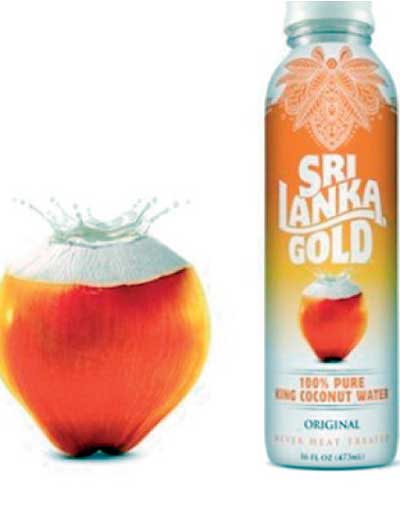Wednesday Feb 25, 2026
Wednesday Feb 25, 2026
Thursday, 24 December 2015 00:38 - - {{hitsCtrl.values.hits}}

Food navigator: Two DC-based international development economists, partners in life and business, are launching bottled king coconut water and are aiming to have it on natural food store shelves by February. It’s safe to assume their product will be the first of its kind.
When driving through Sri Lanka, a ubiquitous sight is the golden orbs that dangle from the roofs of shacks by the road, or piled on street-side tables, or being balanced with finesse on the back of a bicycle. These spheres are the king coconut, or thambili in Sinhalese, a local popular refreshment that international development economist Sheri Pitigala fell in love with 17 years ago while she was on her honeymoon with her spouse Nihal, native to Sri Lanka.
“We were on a road trip across the island and that was the first time I tried the king coconut. I jokingly told him – someone should bottle this and bring it to the US!” Sheri told FoodNavigator-USA.
A little less than two decades later, the duo is about to launch Sri Lanka Gold, a ready-to-drink (RTD) beverage made purely out of king coconut water.
Jumping on coconut water’s momentum
According to Sheri, it was the recent boom of coconut water in mainstream retailers that finally pushed them to realise the idea. Back 10 years ago, she said, coconut water was usually found in a can with added sugar, and buyers would have to go to a non-Western specialty store to find a variety of options on one shelf. Today, they can be found in multiple forms of packaging in many grocery stores, and even convenience stores, gas stations, vending machines and drug stores.
But as it was a decade ago, most packaged coconut water today, if not all, is made out of the young green coconut variant. “Because of our work in international development, we’ve had the opportunity to drink coconuts from all around the world, and we kept telling each other, there’s nothing as good as the Sri Lankan king coconut,” she said. “And when the high pressure processing technology started emerging with all of the cold-press juices, we decided this is really the opportunity to be able to show off the taste difference of the king coconut.”
First of its kind
It’s safe to assume that Sri Lanka Gold will be the first king coconut RTD beverage. The Pitigalas worked together with the Coconut Research Institute of Sri Lanka to research and verify the king coconut’s health benefits.
King coconuts, like their young green cousins, have plenty of electrolytes, but its golden colour means it has more vitamin C than its green counterparts. When it comes to the taste profile, it has a more “balanced, delicate flavour with a crisp and clean feel when you drink it,” Sheri said, compared to the young green kind.
The popular refreshment is drunk directly out of the fruit in its native land, so there wouldn’t really be a market for a packaged version. For North American buyers, however, importing the heavy fruit just for the water would be much costlier compared to freezing the extract and shipping it stateside, and the Pitigalas think that packaging and branding it will be the best way to reach the market.
A local affair
Though it won’t be available in its namesake country, Sri Lanka Gold will remain a local affair. The Pitigalas wanted to make sure that the local communities involved in the process can benefit as much as they can.
Unlike the more industrialised young green variant, which is used for its meat, oil, and water, the king coconut has only been farmed on a small-scale by family-operated farmers in Sri Lanka.
While the Pitigalas manage the operations and oversee the whole supply chain from their home-office in the DC-area, Nihal’s family in Sri Lanka oversee an extracting facility near the nation’s capital that works together with local coconut farmers that use organic practices. In fact, some of them have been certified USDA organic, and the company is helping several other suppliers get their certification.
“We spent a year establishing a network of small farmers,” Sheri said, adding that the Coconut Research Institute helped with finding suppliers from all over the island. “We have close ties to the Sri Lankan community and we’re vested in the community.”
For most of the farmers, it’s their first formal market opportunity with contracts and committed buyers. Suggested pricing for Sri Lanka Gold is around $ 3.39 for a 10oz bottle and $ 5.49 for a 16oz bottle, a price that the Pitigalas have analysed to be a sustainable one that could help support their farmers with fair-trade pricing and continuous professional assistance, leveraging their professional backgrounds in international development. (http://www.foodnavigator-usa.com/)